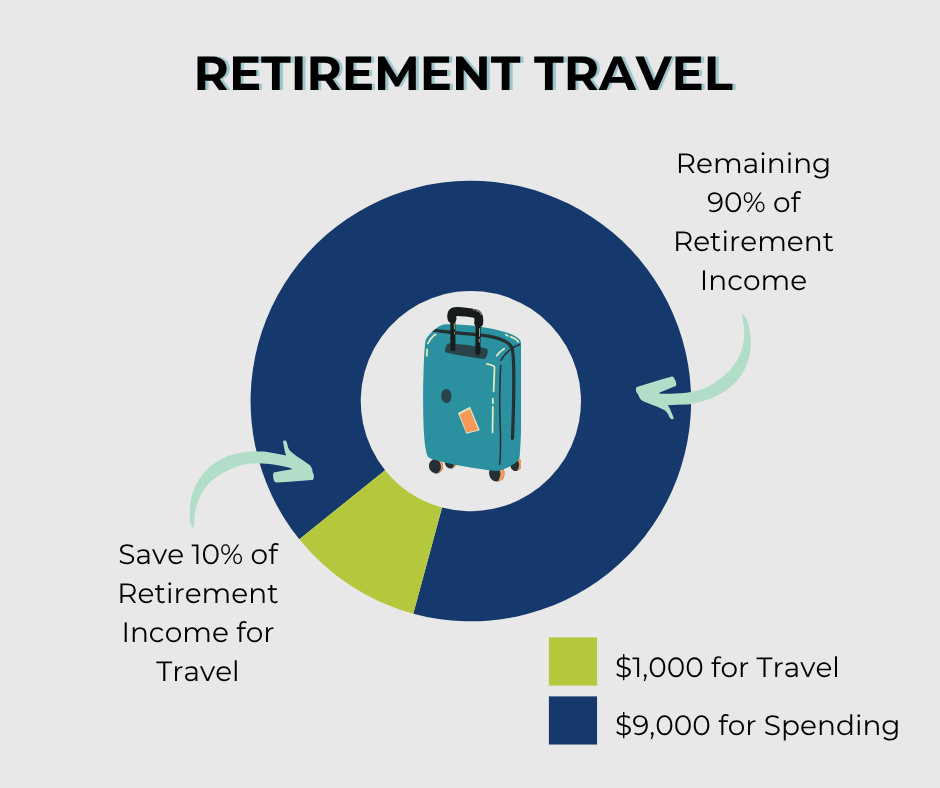You’ll often hear about the first years of retirement nicknamed as the “go-go” years. It’s the time you’ve earned to finally cross off those travel dreams you’ve had pinned up for decades while your health is strong. Maybe for you, those years will be filled with a long-awaited trip to the Grand Canyon, snowbirding during the Ohio winter, or more frequent visits to the grandkids.
With careful planning, it’s totally possible to enjoy traveling during retirement without the nagging worry that you’re accidentally draining your retirement savings too fast.
Unfortunately, many people in their 50s and 60s who want to travel in retirement years aren’t sure exactly how to safely plan for it with their new fixed income.
At Stage Ready Financial Planning, we help retirement savers in Southern Ohio confidently plan the kind of travel they want with their newfound freedom. In this article, we’ll discuss financial tips you need to travel the world, or just the country, with confidence and on your terms.
Key Takeaways
- Don’t Treat Travel as a One-Off: Successfully traveling in retirement means building a dedicated, sustainable travel budget (5% to 10% of your annual retirement spending is a common starting point) to avoid accidentally draining your savings.
- Protect Your Health & Wallet Abroad: Traditional Medicare generally doesn’t cover you outside the U.S., so investing in travel insurance with comprehensive medical coverage is a smart move to protect against shockingly high bills.
- Flexibility is Currency: As a retiree, your biggest asset is time. Leverage off-peak travel dates (mid-week, off-season) to save 30% on hotels and up to 50% on flights compared to peak travel times.
What Makes Travel in Retirement Different?
When you were working, a vacation probably came out of your paycheck and your two weeks of PTO. Even when you splurged on a trip, you probably felt like you could earn some extra income or save a bit more with your future paychecks to make up for it.
In retirement, travel can feel like a different ballgame. If you are like many of our clients, it’s an essential part of your desired lifestyle. You finally have flexibility for when you travel, which can lead to big savings.
That said, your travel spending will probably come from the nest egg you’ve worked years to build and a few costly missteps could mean compromising your income security.
Common Financial Mistakes Retirees Make When Traveling
In regularly working with Dayton area retirees, we see a few common financial mistakes related to travel:
- Forgetting to Plan for Healthcare Abroad: You might be surprised to learn that traditional Medicare generally does not cover you when traveling abroad. Additionally, Medicare Advantage can have location limitations even if you travel within the U.S. While there are a few exceptions like needing emergency care in Canada, these insurance gaps can leave you vulnerable to expensive medical emergencies.
- Ignoring Cash Flow Logistics: Not making a plan for how you’ll access your money while traveling can lead to hundreds of dollars in avoidable fees. Examples include using a credit card with foreign transaction fees or using ATMs with dollar conversion fees. Additionally, using a debit card overseas and selecting to pay in U.S. dollars can subject you to hidden conversion fees. It might also lead to less favorable exchange rates.
- Failing to Plan with Your Financial Professional: Treating travel as a one-off expense instead of a planned, sustainable cost within your overall retirement income might cause you to unsustainably dip into your retirement accounts.
10 Financial Tips for Traveling as a Retiree
Here are some important financial tips that you can explore to build worry-free travel into your retirement plan.
1. Build a Proactive Travel Budget
The first step is to treat your travel spending as a monthly category in your overall retirement budget. Rather than randomly dipping into your investments when you want to take a trip, set aside a predetermined amount of your retirement income for travel expenses each month. This can help you make sure your total savings withdrawals are sustainable.
Some financial professionals suggest setting aside about 5% to 10% of your annual retirement budget for travel. For example, let’s say you have retirement income of $10,000/mo or $120,000/yr. This might translate to an annual travel budget of around $6,000 for a smaller domestic trip or $12,000 for a larger excursion. Meaning each month, you could set aside $500 to $1,000 for your future travel expenses.
The exact percentage of your budget dedicated to travel ultimately depends on your goals and the size of your retirement income and savings.
2. Take Advantage of Your Flexibility
One of your biggest assets as a retiree is the flexibility of your time. You can use it to save money and find more relaxation.
You can avoid peak summer and holiday crowds and prices by traveling during the off season for your preferred destination. The Dollar Flight Club cites that hotel rates can drop 30% and flights can be 50% lower in non peak travel seasons. Additionally, mid-week travel dates like Tuesdays or Wednesdays can help you save money on airfare.
Another benefit of traveling in the off season is reduced crowds. In the spring and early fall, kids are still in school so many popular destinations are far more calm and peaceful.
3. Protect Your Health and Your Wallet
Since Medicare usually doesn’t cover international trips, travel insurance with comprehensive medical and dental coverage can be a smart investment. Look for policies that cover emergency evacuation, lost luggage, and flexible refunds for trip cancellations.
Examples of travel popular travel insurance providers with medical coverage include:
- United Health Care
- Allianz Global Assistance
- Travelex Insurance Services
- Berkshire Hathaway Travel Protection
Travel medical insurance can also be wise, even if you plan on snowbirding or taking a domestic trip. Medicare Advantage and Medicare Part D plans often have limited service areas. Talk to your health insurance provider and financial professional to make sure you’re covered anywhere you go.
4. Use Smart Payment Strategies
Don’t let foreign transaction fees and ATM charges eat away at your budget when traveling abroad. Look for a credit card that offers no foreign transaction fees.
If you travel internationally and pay with a card, you might be prompted to choose between the local currency or U.S. dollars. Consider always paying in the local currency to avoid unnecessary conversion fees and less favorable exchange rates.
If you use travel credit card rewards for flights or lodging, be mindful of annual fees. Make sure your card’s annual fees don’t exceed the value of your rewards. There are plenty of cash-back rewards credit cards with no annual fee that can make trip planning much easier. Also be sure to pay your balance in full to avoid interest.
Using foreign ATMs with your debit card can be risky. This is true from a security standpoint and because of conversion fees. Instead of frequent ATM visits, consider withdrawing larger amounts when you need them to reduce the fees from your bank and the ATM.
5. Consider Value Destinations and Longer Stays
If you’ve lived in the midwest most of your life, you are likely used to getting great value for your dollar. As a retiree, you can apply that mindset to your travel if you want to stretch your retirement income further.
According to a recent article by Kiplinger, countries like the Dominican Republic, Mexico, and Thailand, or even US cities like Albuquerque, NM, or Myrtle Beach, SC, offer great experiences at a notably lower cost.
Traveling for a long period of time might allow you to find better rates when booking, especially when renting a house using Airbnb or VRBO. Longer stays provide more cash flow predictability for the owner and less turnover means fewer cleaning fees.
6. Don’t Overlook Expenses That Add Up
If someone asks you what you spend each month, you can probably list your big bills easily. That said, a lot of your spending likely comes from regular trips to the store, grocery, restaurants, etc. These expenses are harder to recall and if you had to guess, you might be surprised by their total.
Similarly with your trip planning, it’s easy to budget for flights and hotels, but the smaller variable travel expenses can add up quickly.
Beyond the cost of travel insurance, remember to budget for things like:
- Baggage fees
- Car rentals, taxis, or Uber
- Restaurants and groceries
- Tipping hotel staff during your entire trip
- Miscellaneous shopping
- The cost of excursions
7. Take Advantage of Senior Discounts and Group Memberships
One of the perks of being over 50 is qualifying for senior discounts. Always ask about a senior discount at hotels, museums, train stations, and attractions. An AARP membership can unlock significant savings on car rentals (up to 35% off with some companies), cruises, and hotels. AARP members and seniors also have access to popular discounts like lifetime national parks passes.
Look into joining senior travel groups for group rates and support, or leverage other membership travel discounts like Costco Travel or AAA.
8. Keep an Eye on Cash Flow and Withdrawals
Especially if you’re traveling for an extended time, make sure your regular bills (mortgage, utilities back home) are set up for auto-pay and that you have a steady stream of income (like your Social Security benefits) being deposited. Retirement travel can feel more stressful if you manually pay your bills and have to navigate due dates while you’re gone.
Ideally, you’ve built your travel savings into your current retirement income. If for some reason you haven’t, be sure to work with your financial professional to decide the most tax-efficient way to pay for your trips. For example, you might need to decide between taking your withdrawal from a taxable brokerage account, a Roth IRA, or your pre-planned RMDs.
9. Plan for Extended or Slow Travel Logistics
If you want to snowbird in retirement, it might require more planning than a simple two-week trip. You’ll need to plan ahead with mail forwarding or having a trusted neighbor collect it.
Also, factor in the cost of basic home upkeep while you are gone including lawncare and making sure your HVAC is working properly. If you are doing extended travel in the winter, you might also need to have a plan to make sure pipes don’t burst while you are gone.
Installing a security camera system, such as Ring or SimpliSafe might provide some needed peace of mind if you are going to be away for longer than a week or two.
10. Revisit Your Travel Budget Each Year With Your Financial Advisor
Your travel goals and expenses will change over time, especially over a multi-decade retirement. Just like you review your investment portfolio, you should review your travel expenses each year. This will help you reflect on what you actually spent and decide what trips you’re prioritizing for the next 12 months.
Ultimately, the goal is to travel sustainably while you are healthy, without putting your retirement savings long-term health in jeopardy. Your financial advisor will be able to help you make sure your investment withdrawal plan supports your retirement travel goals.
How Can Stage Ready Financial Planning Help Your Travel and Retirement?
You’ve worked hard and saved well. Now it’s time to live the life you planned, including the travel you’ve been waiting for.
At Stage Ready Financial Planning, we don’t just manage your investments; we create a comprehensive retirement plan designed to support your ideal life. We want you to enjoy those amazing trips without ever having to check the bank account mid-vacation.
As your fee-only financial professional, we will help you make sure your “go-go” travel doesn’t compromise your “no-go” financial security and determine the most tax-efficient way to pay for your big trips.
If you’re over 50, planning your retirement, or you’ve already retired and you’ve saved $750,000 or more, let’s make sure your travel dreams are financially sound.
Schedule Your Intro Call Today to Learn More about Making Your Dream Retirement a Reality!
FAQs
How much should I budget for travel in retirement?
Some financial professionals suggest budgeting 5% to 10% of your annual retirement spending for travel. Ultimately, the amount you dedicate to travel should be based on your travel goals and financial situation. It’s also likely that your retirement travel budget will be highest in your active “go-go” years, and decline as your health changes. Be sure to work with your financial advisor to determine how much travel you can easily afford in retirement.
How can I afford to travel on a fixed income?
Affording travel on a fixed income comes down to strategy. Consider being flexible with your dates, traveling during the off season, leveraging senior discounts, travel credit card rewards, and prioritizing cost-effective destinations. To make budgeting easier, treat travel as a planned expense instead of worrying about how to pay for it after the fact.
Should I use retirement savings or regular income to fund travel?
This is a nuanced question best answered with your financial professional. We often encourage our clients to cover travel from their regular, planned retirement income and cash flow (like Social Security benefits, pension, or planned withdrawals). This way we don’t put too much strain on their retirement accounts in any given year.
Your financial advisor will also be able to help you decide the most tax-efficient source for these withdrawals, which may include your taxable account, Roth IRA, or from pre-planned RMDs.
Are there Ohio-based senior travel programs or discounts?
While discount programs like AARP are usually national, you can look for senior travel groups or organizations within the Dayton and Cincinnati areas that arrange group tours. Always check with local community centers, YMCAs, or your local AAA office for regional deals and programs tailored to older adults.
About the Author
Joseph A. Eck, CFP®, is the owner and lead financial advisor at Stage Ready Financial Planning. He’s dedicated to helping retirement savers like you achieve peace of mind by creating retirement plans that make your dream lifestyle, including frequent, worry-free travel a reality. With over a decade of experience, Joseph provides personalized guidance on topics like tax-efficient retirement income withdrawals to fund your travel, leveraging senior discounts, and ensuring you have the right health protection while you’re away. A proud member of the Dayton, Ohio community, Joseph is committed to providing down-to-earth, professional financial guidance and wealth management.
Article References
- AARP. “National Parks Free Entrance Day.” Accessed November 5, 2025. https://www.aarp.org/travel/vacation-ideas/outdoors/national-parks-free-entrance-day/
- AARP. “Travel Center: Member Deals on Hotels, Flights, Vacations & Car Rentals.” Accessed November 5, 2025. https://www.expedia-aarp.com/
- AARP. “Membership Benefits: Travel.” Accessed November 5, 2025. https://www.aarp.org/membership/benefits/travel/
- AAA. “TripCanvas.” Accessed November 5, 2025. https://www.aaa.com/tripcanvas
- Allianz Travel Insurance. Accessed November 5, 2025. https://www.allianztravelinsurance.com/
- Ameriprise Financial. “Travel in retirement: financial considerations.” Accessed November 5, 2025. https://www.ameriprise.com/financial-goals-priorities/retirement/travel-in-retirement-financial-considerations
- Berkshire Hathaway Travel Protection (BHTP). Accessed November 5, 2025. https://www.bhtp.com/
- Condé Nast Traveler (CNT). “Off-Season: The Best Time to Travel.” Accessed November 5, 2025. https://www.cntraveler.com/story/off-season-the-best-time-to-travel
- Costco Travel. Accessed November 5, 2025. https://www.costcotravel.com/
- Dollar Flight Club. “Ultimate Guide to Off-Season Travel Savings.” Accessed November 5, 2025. https://dollarflightclub.com/articles/ultimate-guide-to-off-season-travel-savings/
- Investopedia. “Traveling in Retirement.” Accessed November 5, 2025. https://www.investopedia.com/traveling-in-retirement-8726257
- Kiplinger. “Most Valuable Vacation Destinations for Retirees in 2026.” Accessed November 5, 2025. https://www.kiplinger.com/retirement/happy-retirement/most-valuable-vacation-destinations-for-retirees-in-2026
- Medicare. “Coverage: Travel Outside the U.S.” Accessed November 5, 2025. https://www.medicare.gov/coverage/travel-outside-the-u.s..
- Medicare Resources. “Glossary: Service Area.” Accessed November 5, 2025. https://www.medicareresources.org/glossary/service-area/
- NerdWallet. “Foreign Transaction Fee.” Accessed November 5, 2025. https://www.nerdwallet.com/credit-cards/learn/foreign-transaction-fee
- The Travel Folk. “How to Save Money on Airbnb with Long Term Stays.” Accessed November 5, 2025. https://thetravelfolk.com/save-money-airbnb-long-term-stays/
- Travelex Insurance Services. Accessed November 5, 2025. https://www.travelexinsurance.com/
- United Health Care (UHC). “Dental, Vision, Supplemental Plans: Travel Medical Insurance.” Accessed November 5, 2025. https://www.uhc.com/dental-vision-supplemental-plans/travel-medical-insurance
This communication is for informational purposes only and is not intended as investment, tax, accounting, or legal advice, as an offer or solicitation of an offer to buy or sell, or as an endorsement of any company, security, fund, or other securities or non-securities offering. This communication should not be relied upon as the sole factor in an investment making decision. Past performance is no indication of future results.


